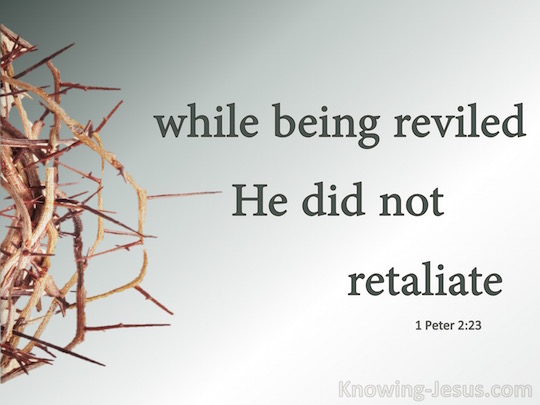Parallel Verses
Weymouth New Testament
When He was reviled, He did not answer with reviling; when He suffered He uttered no threats, but left His wrongs in the hands of the righteous Judge.
New American Standard Bible
King James Version
Who, when he was reviled, reviled not again; when he suffered, he threatened not; but committed himself to him that judgeth righteously:
Holman Bible
He did not revile in return;
when He was suffering,
He did not threaten
but entrusted Himself to the One who judges
International Standard Version
When he was insulted, he did not retaliate. When he suffered, he did not threaten. It was his habit to commit the matter to the one who judges fairly.
A Conservative Version
Who, being reviled, did not revile in return. Suffering, he did not threaten, but yielded to him who judges righteously.
American Standard Version
who, when he was reviled, reviled not again; when he suffered threatened not; but committed himself to him that judgeth righteously:
Amplified
While being reviled and insulted, He did not revile or insult in return; while suffering, He made no threats [of vengeance], but kept entrusting Himself to Him who judges fairly.
An Understandable Version
When He was spoken to with harsh insults, He did not reply in the same way. When He was made to suffer, He did not threaten [His tormentors], but instead entrusted Himself to God, [whom He knew] would make a righteous judgment [in the matter].
Anderson New Testament
When he was reviled, he did not revile again; when he suffered, he did not threaten, but committed himself to him that judges righteously.
Bible in Basic English
To sharp words he gave no sharp answer; when he was undergoing pain, no angry word came from his lips; but he put himself into the hands of the judge of righteousness:
Common New Testament
when he was reviled, he did not revile in return; when he suffered, he uttered no threats, but he trusted himself to him who judges justly.
Daniel Mace New Testament
who, when he was reviled, did not revile again: when he was in his sufferings, he did not threat, but referr'd his cause to the righteous judge.
Darby Translation
who, when reviled, reviled not again; when suffering, threatened not; but gave himself over into the hands of him who judges righteously;
Emphatic Diaglott Bible
who, when he was reviled, did not revile in return; when he suffered he did not threaten, but committed his cause to him who judges righteously-
Godbey New Testament
who, being reviled, reviled not again; suffering, he threatened not, but gave up to the one judging righteously:
Goodspeed New Testament
He was abused but he did not retort. He suffered but he did not threaten, but committed his case to him who judges justly.
John Wesley New Testament
Who when he was reviled, reviled not again, when he suffered he threatened not, but committed himself to him that judgeth righteously:
Julia Smith Translation
Who, being reviled, reviled not back; suffering, he threatened not; and delivered to him judging justly;
King James 2000
Who, when he was reviled, reviled not again; when he suffered, he threatened not; but committed himself to him that judges righteously:
Lexham Expanded Bible
who [when he] was reviled, did not revile in return; [when] suffering, he did not threaten, but entrusted [himself] to the one who judges justly,
Modern King James verseion
who when He was reviled did not revile in return. When He suffered, He did not threaten, but gave Himself up to Him who judges righteously.
Modern Spelling Tyndale-Coverdale
which when he was reviled, reviled not again: when he suffered, he threatened not: but committed the cause to him that judgeth righteously,
Moffatt New Testament
he was reviled and made no retort, he suffered and never threatened, but left everything to Him who judges justly;
Montgomery New Testament
He was reviled, and reviled not back. When he suffered he never threatened but always committed his cause to the One who judges rightly.
NET Bible
When he was maligned, he did not answer back; when he suffered, he threatened no retaliation, but committed himself to God who judges justly.
New Heart English Bible
Who, when he was cursed, did not curse back. When he suffered, did not threaten, but committed himself to him who judges righteously;
Noyes New Testament
who, when he was reviled, reviled not again; when he suffered did not threaten, but committed himself to him that judgeth righteously;
Sawyer New Testament
who being reviled reviled not, suffering threatened not, but committed himself to him that judges righteously,
The Emphasized Bible
Who, being reviled, was not reviling again, suffering, he was not threatening, but was making surrender unto him that judgeth righteously, -
Thomas Haweis New Testament
who, when reviled, reviled not again; when he suffered, he used no menaces; but referred himself to him who judgeth righteously:
Twentieth Century New Testament
He was abused, but he did not answer with abuse; he suffered, but he did not threaten; he entrusted himself to him whose judgments are just.
Webster
Who, when he was reviled, reviled not again; when he suffered, he threatened not; but committed himself to him that judgeth righteously:
Williams New Testament
Although He was abused, He never retorted; although He continued to suffer, He never threatened, but committed His case to Him who judges justly.
World English Bible
Who, when he was cursed, didn't curse back. When he suffered, didn't threaten, but committed himself to him who judges righteously;
Worrell New Testament
Who, when reviled, reviled not again; when suffering, was not threatening, but committed Himself to Him Who judgeth righteously;
Worsley New Testament
who, when He was reviled, reviled not again; when He suffered, He threatened not; but committed Himself to Him that judgeth righteously.
Youngs Literal Translation
who being reviled -- was not reviling again, suffering -- was not threatening, and was committing himself to Him who is judging righteously,
Themes
Afflicted saints » Should imitate Christ
Christ » Mediator » Meekness of
Committal » Committal into God's hands
Christian conduct » Following the example of Christ
Christ, our example » Conformity to, required in » Suffering wrongfully
Examples » Jesus Christ being an example
God » Trust in » Committal into God's hands
Meekness » Examples of » Christ's
Meekness » Christ set an example of
Mocking » The persecutors of jesus mock him
Revenge » Christ an example of forbearing
Revenge » Jesus an example of forbearing
Reviling and reproaching » The conduct of Christ under
God, Righteousness Of » Christ committed his cause to
Topics
Interlinear
De
Paradidomi
References
Hastings
Word Count of 38 Translations in 1 Peter 2:23
Prayers for 1 Peter 2:23
Verse Info
Context Readings
Submission Of Slaves To Masters
22 He never sinned, and no deceitful language was ever heard from His mouth. 23 When He was reviled, He did not answer with reviling; when He suffered He uttered no threats, but left His wrongs in the hands of the righteous Judge. 24 The burden of our sins He Himself carried in His own body to the Cross and bore it there, so that we, having died so far as our sins are concerned, may live righteous lives. By His wounds yours have been healed.
Names
Cross References
Luke 23:46
and Jesus cried out in a loud voice, and said, "Father, to Thy hands I entrust my spirit." And after uttering these words He yielded up His spirit.
Hebrews 12:3
Therefore, if you would escape becoming weary and faint-hearted, compare your own sufferings with those of Him who endured such hostility directed against Him by sinners.
Matthew 27:39-44
And the passers-by reviled Him. They shook their heads at Him
Mark 14:60-61
At last the High Priest stood up, and advancing into the midst of them all, asked Jesus, "Have you no answer to make? What is the meaning of all this that these witnesses allege against you?"
Mark 15:29-32
And all the passers-by reviled Him. They shook their heads at Him and said, "Ah! you who were for destroying the Sanctuary and building a new one in three days,
Luke 22:64-65
or blindfolded Him, and then challenged Him. "Prove to us," they said, "that you are a prophet, by telling us who it was that struck you."
Luke 23:9
So he put a number of questions to Him, but Jesus gave him no reply.
Luke 23:34-39
Jesus prayed, "Father, forgive them, for they know not what they are doing." And they divided His garments among them, drawing lots for them;
John 8:48-49
"Are we not right," answered the Jews, "in saying that you are a Samaritan and are possessed by a demon?"
John 19:9-11
"What is your origin?" he asked. But Jesus gave him no answer.
Acts 4:29
And now, Lord, listen to their threats, and enable Thy servants to proclaim Thy Message with fearless courage,
Acts 7:59
So they stoned Stephen, while he prayed, "Lord Jesus, receive my spirit."
Acts 8:32-35
The passage of Scripture which he was reading was this: "Like a sheep He was led to slaughter, and just as a lamb before its shearer is dumb so He opened not His mouth.
Acts 9:1
Now Saul, whose every breath was a threat of destruction for the disciples of the Lord,
Acts 17:31
seeing that He has appointed a day on which, before long, He will judge the world in righteousness, through the instrumentality of a man whom He has pre-destined to this work, and has made the fact certain to every one by raising Him from the dead."
Romans 2:5
The fact is that in the stubbornness of your impenitent heart you are treasuring up against yourself anger on the day of Anger--the day when the righteousness of God's judgements will stand revealed.
Ephesians 6:9
And you masters, act towards your slaves on the same principles, and refrain from threats. For you know that in Heaven there is One who is your Master as well as theirs, and that merely earthly distinctions there are none with Him.
2 Thessalonians 1:5
For these are a plain token of God's righteous judgement, which has in view your being deemed worthy of admission to God's Kingdom, for the sake of which, indeed, you are sufferers.
2 Timothy 1:12
That indeed is the reason why I suffer as I do. But I am not ashamed, for I know in whom my trust reposes, and I am confident that He has it in His power to keep what I have entrusted to Him safe until that day.
2 Timothy 4:8
From this time onward there is reserved for me the crown of righteousness which the Lord, the righteous Judge, will award to me on that day, and not only to me, but also to all who love the thought of His Appearing.
1 Peter 3:9
not requiting evil with evil nor abuse with abuse, but, on the contrary, giving a blessing in return, because a blessing is what you have been called by God to inherit.
1 Peter 4:19
Therefore also, let those who are suffering in accordance with the will of God entrust their souls in well-doing to a faithful Creator.
Revelation 19:11
Then I saw a door open in Heaven, and a white horse appeared. Its rider was named "Faithful and True" --being One who in righteousness acts as Judge, and makes war.






